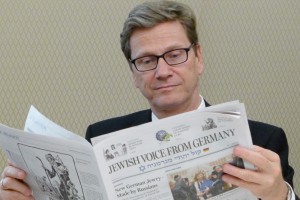German Foreign Minister Guido Westerwelle takes a clear stand when it comes to facing Europe’s financial crisis and defending Germany’s support for Israel
 JVG: What is your assessment of the risks and opportunities entailed by the changes Europe is currently undergoing?
JVG: What is your assessment of the risks and opportunities entailed by the changes Europe is currently undergoing?
In this era of globalization, Europe is our “life insurance.” Germany may appear to be a big player on the continent, but on a global scale we’re tiny. We Europeans will not be able to preserve our standard of living or protect our wonderful and liberal lifestyle, based on the principle of freedom, unless we work at it together. That means we will have to take the integration of Europe to the next level. If you don’t go forwards, you’re falling back. We will have to draw the right lessons from the sovereign debt crisis, but without letting it cloud our vision of the future. Other foreign ministers in Europe and I are already developing new ideas on how to take Europe to the next stage.
Heavy financial burdens are looming over the European Union. Germany keeps emphasizing that financial consolidation and growth can’t be promoted by borrowing. A number of European politicians seem to be coming to a different conclusion. France for example, under the leadership of its new president, is now coming out in favor of Eurobonds. This would mean a signifi cant interest rate hike in Germany …
It is possible to jeopardize Europe by showing too much solidarity, it seems, and not only by too little. Overburdening Europe’s stronger economies is no help to the weaker ones. Eurobonds are not just a fi nancial matter of form but rather an existential political issue. If we were to assume joint and severable liability in Europe for the debts of countries unwilling to make reforms, this would mean we have learned nothing from the debt crisis. Germany cannot go along with the introduction of Eurobonds.
In Greece, Hungary and France, we are seeing populist, even openly fascist, political forces gaining popular support. What can be done to counteract this?
This is not the first time that extremist movements on the left or right have attempted to benefi t from a crisis. My impression, however, is that the vast majority of European nations – and the vast majority of their respective populations – have no intention of going down the path of re-nationalization, simply because it would be wrong. The most compelling program against political extremism is to deliver compelling results. For me, unemployment among Europe’s youth is the most dangerous consequence of the twin financial and debt crises. But there is a clear response to this: introduce structural reforms to boost employment and give young people a leg up on life. The single best recipe to immunize impressionable youth against political demagoguery is to get them off the streets with sensible economic policies, giving them gainful employment and a goal to work towards.
When the “Jewish Voice” was launched, you welcomed the fact that Judaism was once again a part of German society, going so far as to express great satisfaction, even gratitude on this score. How does the future look, in your view?
First of all, I’m extremely pleased that Jewish life – and here I mean not just the religion, but also the many facets of Jewish culture – is once again blossoming and thriving in Germany, while also attracting the interest of more and more people from other confessions. When I think back on my years as a secondary school student in Bonn, I recall having a single Jewish schoolmate, which was quite unusual at the time. Nowadays, my friends’ children tell me that it’s much more common – not yet an every-day thing, but getting there. I fi nd that both surprising and heart-warming!
You were the first German cabinet minister to criticize Günter Grass’ recent poem, and in no uncertain terms. Why?
His remarks didn’t just turn everything on its head; they also triggered a debate that ultimately harmed our country, in particular in the way we were being perceived abroad. As Foreign Minister, I could feel how these misrepresentations were causing real concern internationally, and not just in Israel. The wrong-headed and absurd provocation to the effect that it isn’t Iran threatening Israel’s security, that it’s the other way around, completely reverses cause and effect. But because it was a Nobel Laureate voicing this opinion, a debate ensued. And I suspect that was precisely what had been intended.
I thought long and hard about whether it was my role as a cabinet member to respond to a polemic masquerading as “art.” But when I saw the waves this was making, also abroad, I felt I had to take a clear stand regarding Günter Grass’ remarks, both domestically and in the global arena.
To me the German-Jewish dialogue often dwells on working through the past. How do we find our way forward to the present?
The contention that the darkest chapter of our history somehow keeps or prohibits us Germans from criticizing the Israeli government is totally off the mark. We need to highlight more clearly that our relationship to the Jewish State is not just a response to the Holocaust; it is also based on a partnership of shared values. The fact remains that Israel is still the only true, functioning democracy in the entire region.
As far as Jewish life in Germany is concerned, I place my faith fi rst and foremost in youth, just as I do for the relationship between Germany and Israel: the friendships among our young people, the student exchange programs, are a sound basis. Certainly, this is the most arduous path to take and will take a long time, but it is also the most important and most sustainable way of building bridges. I only have to think back to my fi rst visit to Israel as a student, me with my blue eyes, blond hair and Teutonic accent. How well I remember my inhibitions – but I also remember how people went out of their way to help me feel at ease. Even then, I could sense the intense vulnerability of this tiny nation.
At the recent AJC convention in Washington D.C., you pointed out that the security of Israel was a vital German interest.
The statement “Israel’s security and right to exist is a defining part of German policy” remains valid and hardly needs parsing. The fact is that Iran’s developing a nuclear arsenal affects not just the security of Israel, but the stability of the entire region. This is another reason why we must prevent a nuclear arms race from setting in, or we will suddenly see one country after another pursuing atomic weapons. Just imagine if the recent threat to block the Strait of Hormuz had been made by a nuclear power! It is clearly in our interest to prevent Iran from acquiring a nuclear weapons capability, be it through diplomatic or political channels.
Aside from the record electoral result of 14.6 % achieved back in 2009, your party, the liberal FDP, seems to be languishing around the 5 % mark. Do you see a way of convincing more German citizens of economic liberalism?
The last Bundestag election demonstrated the potential of the FDP. And the next election to our national parliament will again offer ample opportunities for the Free Democrats. The more the other parties get caught up in “spreading the wealth,” the greater the need for a party that stands behind the principle that one’s living has to be earned, and that performance must be rewarded. The triad of willingness to work hard, openness to the outside world, and tolerance constitutes a program that millions of German voters will find attractive.

